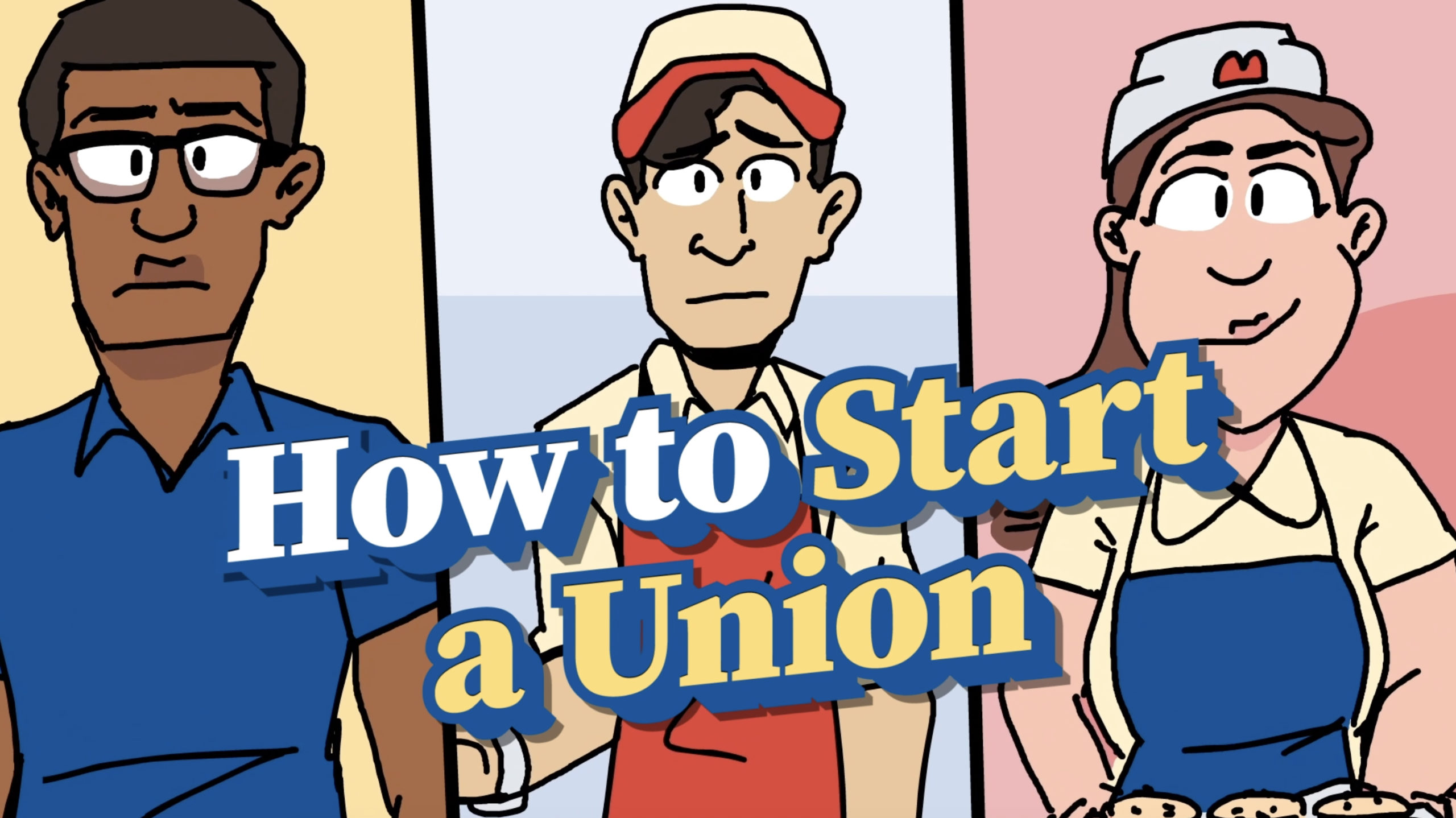Starting a Union in 7 Easy Steps
Want to Start a Union at Your Workplace?
It’s our job to help with that. No matter your questions, we’re here to answer them and serve you.
No experience with unions? No problem. You can start a labor or trade union at almost any company as long as you and your coworkers decide your job would be better with a union to back you up.
Ready to learn how to unionize? Let’s go!
Take the first step towards unionizing
Follow Start a Union!
– Keona Johnson, UFCW Local 368A, AlbertsonsWe are going to have a voice at work. We work hard and we are asking for recognition, better pay, benefits, and a more predictable work schedule that allows us to better plan our lives.
How To Start a Union At Your Workplace in 7 Steps
Step 1: Talk to Your Coworkers
A union is when workers join together to improve their jobs. Talk to your coworkers about wages, benefits and working conditions to see if they want to make them better, too.
More on Talking to Coworkers
It can be intimidating trying to jump into a conversation like this, so start with coworkers who you already know well. When you’re chatting with them, at work or elsewhere, start finding natural ways to ask them questions like:
“How have your schedules been lately?”
“Do you feel like we’re getting paid enough for our work?”
“What would you change about our work if you could?”
After you start talking to people like this, you’ll start to see what other issues people are having, and how much support you’ll be able to get for a union from each person. This is all crucial info that you’ll want to bring with you for your first conversation with a union organizer.
Learn more: Talking to your coworkers
Step 2: Talk to a Union Organizer
No matter your questions, we’re here to answer them and serve you. From learning how you can start a union to better understanding all the steps involved in negotiating a contract, we want you to have all the information you need.
More on Your First Convo with a Union Organizer
When reaching out to one of our union organizers, there are a few key things that they’ll talk to you about. Here’s a few questions to keep in mind before your first conversation with us:
“What are some of the issues and concerns that people have at your workplace?”
“Who do you know at work?”
“How many of these people do you have a strong relationship with?”
“Who among them do you think would be supportive of a union?”
“What is the structural make-up of your workplace? What are the shifts, departments, etc?”
“What is the breakdown of race, gender, age demographics at your workplace? How many languages are spoken on a given day there?”
“Do people across departments have the same issues or different ones?”
Each of these questions reveals important details about how to best set up your union campaign from here. But don’t worry: you don’t need to have answers to all of these before an organizer talks with you. In fact, it’s part of our job to help you answer them!
Step 3: Start a Committee
With the help of a Union Organizer, you and your coworkers will build an organizing committee. This will be the key group of leaders at your workplace who feel strongest about the need to organize. Your committee will then work together to get more coworkers involved with the effort to win a union contract that makes everyone’s job better.
More on Organizing Committees
The folks you pick for your organizing committee will lead the charge in building your union and are the spokespeople for your campaign, so it’s important that you choose your members wisely. To ensure you have the strongest committee for your union campaign, here are some qualities you want to see in your committee:
- A variety of departments and shifts represented in the committee
- Diversity in age, gender, and race that is reflective of your workplace
- Workers who are are leaders and who you and your coworkers know are trustworthy — the kind of people you go to when you have a question you need answered.
The more representative your committee is, the easier it will be to continue having conversations with everybody across your workplace. And the more your coworkers respect them, the more excited they’ll be when they talk about your union campaign.
Step 4: Know Your Rights
Unions like the UFCW will bring you more control over your wages, benefits and workplace conditions. Companies would rather keep that control for themselves, so they often try to discourage employees from starting a union. Don’t worry, it is your right, protected by federal labor law, to start a union. You have the right to talk to your coworkers about starting a union and about workplace conditions, including pay.
More on Your Labor Rights
The rights you have to union activity in the United States are protected by the National Labor Relations Act (NLRA). Everything in this law lays out the protections you have to speak and act with your coworkers to improve your working conditions with a union.
While the NLRA guarantees your rights to unionize, we know that not every employer follows it. But there are plenty of ways to make it harder for them interfere with your hard work!
For more on the rights you have to organize, and how to ensure that your employer will observe them during your union campaign, check out our Know Your Rights hub.
Step 5: Sign Union Support Cards
Once a majority of your coworkers agree on the need to have a union, you will sign support cards. These cards declare that you want to start a union and have the UFCW as your partner at work to help negotiate better wages, benefits and working conditions.
More on Support Cards
When someone signs a support card, they’re showing everybody else at work that they’re ready to have a union at their workplace. If you’re able to get a strong majority of people sign on, it confirms how much support your campaign actually has before going into a union election.
This is a kind of structure test that is crucial to assessing how likely you really are to win your union election: It’s one thing when somebody tells you they’ll vote yes so you’ll stop bugging them about it, but when they agree to sign cards with everybody else, it shows that they mean business!
Step 6: Vote!
Once a majority of your coworkers have signed union support cards, they are submitted to the National Labor Relations Board to request a union election. This part can take several weeks as the Board decides on an election date and determines who at your workplace can vote. If a majority of your coworkers vote YES at your election, your employer now has to recognize your union and bargain with you and your coworkers.
More on Union Elections
In most cases, the process for standard union elections begins when you file for your election with the NLRB. You and your employer will settle on the date, location, and other terms of your election via something called a stipulated agreement. Once you make this agreement, you can start preparing for your actual union election.
Every last step leading up to this point will influence how big of a win you can get for your union. Your organizing committee will be working closely to make sure that every YES vote is confirmed and accounted for.
Step 7: Negotiate Your Contract
Congratulations! It’s time to get the benefits you deserve! UFCW and our negotiating team will begin working with you and your coworkers to negotiate your first union contract. You and your coworkers will have the opportunity to vote on the contract before it is finalized to ensure it has the benefits and value you deserve. After you’ve won your first contract, you can officially obtain UFCW membership!
More on Your First Contract
From here, you and your newly formed union family will choose a bargaining committee to sit across the table from management as they negotiate over all of the conditions and benefits included in your contract. They’ll work with UFCW staff to make sure that all of the biggest issues at your workplace are addressed.
As your committee continues to meet with management, they’ll settle on each subject and make tentative agreements on each issue. It’s called tentative because nothing is set in stone in this process until all of your coworkers vote on it.
After your bargaining committee reaches a full tentative agreement with the company, they will review it with all your coworkers. You will all have an opportunity to vote yes or no to the tentative agreement. If you and your coworkers vote yes, you then have a contract! A union contract is like a handbook but so much better — because you have a real say in what’s in it and your boss can’t change it own their own at any time like they could with their handbook.
Read more: Union Contracts and Bargaining
Hear from Our Members about the Benefits of Having a Union
It was my union that made sure my job had a good salary and benefits. Even more important, they helped me get my schedule in advance. So that I could plan my life, a full month ahead of time. When you’re a single parent, the difference that that makes is everything. Now, I can spend time with my daughter, and plan who will take care of her when I can’t.
It helps me raise my daughter right. It changed my life. My union family made the difference for my family and my life.
Kim Mitchell,
UFCW Local 400
The truth is that without UFCW fighting for us, standing up for me, we know our jobs wouldn’t have the wages or benefits that we deserve.They listen to us. They fight for us. They negotiate strong contracts — contracts that have helped me take care of myself and the ones I love. They’ve made a real difference in my life.
Jose Guarado,
UFCW Local 770
It was my union that made sure my job had a good salary and benefits. Even more important, they helped me get my schedule in advance. So that I could plan my life, a full month ahead of time. When you’re a single parent, the difference that that makes is everything. Now, I can spend time with my daughter, and plan who will take care of her when I can’t. It helps me raise my daughter right. It changed my life. My union family made the difference for my family and my life.
Kim Mitchell,
UFCW Local 400
The truth is that without UFCW fighting for us, standing up for me, we know our jobs wouldn’t have the wages or benefits that we deserve.They listen to us. They fight for us. They negotiate strong contracts — contracts that have helped me take care of myself and the ones I love. They’ve made a real difference in my life.
Jose Guarado,
UFCW Local 770
– Melissa Gutierrez, UFCW Local 1428, Rite AidMy union contract guarantees that I wasn’t penalized when I took maternity leave. When I returned to work my union made sure the company gave me my annual wage increase that I missed while on leave.
Pros and Cons of Having a Union
A union is a proven way to make your job better. When you have a union, you and your coworkers get to have a say in your wages, schedule, vacation policy, retirement plan, store safety, and anything else that impacts your life at work.
| UFCW Union Advantage | With a Union | No Union |
|---|---|---|
| Better wages and regular raises | ||
| The ability to come together with your coworkers to negotiate your pay and benefits | ||
| Guaranteed hours and stable schedules | ||
| Affordable healthcare with coverage for prescriptions, dental and vision | ||
| Free college for you and your family | ||
| More paid vacation, holidays, and sick days | ||
| A dispute procedure that legally protects you against unfair discipline or dismissal | ||
| Protections against any harassment from management | ||
| Secure retirement and pension benefits | ||
| Seniority rights when it comes to scheduling, vacation and job security | ||
| Discounts on home & life insurance, travel, car rental, legal services, cell phones, and more | ||
| Respect in your workplace | ||
| Must accept unfair or unjust discipline |




